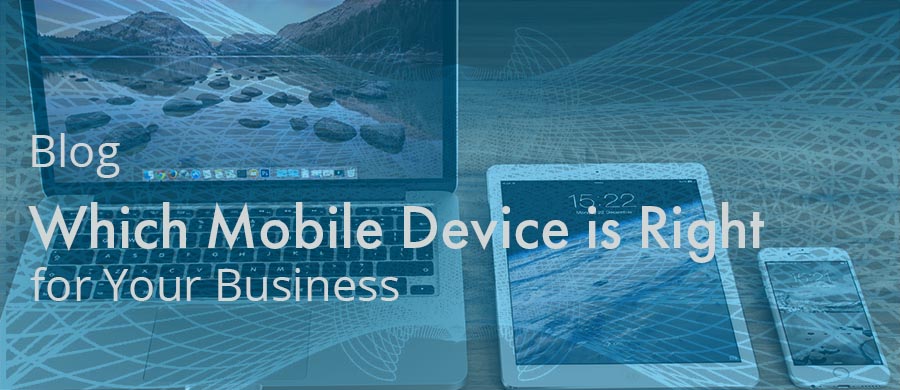When you’re considering mobile devices for your business there are a number of factors to consider, which can make the difference between a huge expense and a headache, and a vital tool that enhances productivity and communication between all departments.

Any business utilising mobile workforce management has to consider the following factors while choosing mobile devices:
- Cost of Mobile Devices, Ongoing Support and Replacement/Repairs and Upgrades
- Security for All Business Data
- Suitability of Device to the Specific Industry
- BYOD (Bring Your Own Device) Contracts and Security
Cost of Mobile Devices
Once it was necessary to invest in specialist devices designed for business use but as the technology has developed, it’s been found that most businesses can save money by purchasing consumer devices. These are more than adequate, and with the right apps and programmes installed to perform most business tasks, are saving companies money.
When we talk about cost, you have to consider far more than the initial outlay for the products. As well as the initial cost of purchasing enough mobile devices for everyone who needs one, you have to factor in cost for support. A dedicated service will ensure that the devices are up to date with the latest software and the data being shared are secure. There also needs to be a budget for the inevitable repairs and replacement of mobile devices damaged or lost in the field, and upgrading the software and technology as required. Furthermore, all users need to understand how to use the device effectively and that the devices are being properly and effectively used for the business needs. Last but not least, the user’s use of the device for non-work related activities should be regularly monitored.
Security for All Business Data
Securing the data being shared across multiple mobile devices is a priority – and this can be achieved by encryption, password access to restricted data, and setting differing permissions for access to files for those in more senior positions, meaning that staff can only access data that is relevant and permissible for their specific role.
This data management is a priority for businesses and will need to be carefully monitored. Detailed device usage policy should outline the guidelines for this data access and the consequences of mishandling company data, or the company device being used for personal reasons.
Suitability of Mobile Devices to the Specific Industry
The industry you work in determines which kind of mobile devices are best suited to your needs. Blue collar workers would be more likely to require a rugged device; something that can handle rough use on building sites, that will survive being thrown in the back of a van and indelicate handling in a more physical environment. These environments are also more likely to need a bigger budget for repairs, as the devices, even when designed for rougher handling, are more likely to be damaged in the workplace.
White collar workers such as field sales team members are better suited to tablets, which are ideal for form filling, document creation and processing large amounts of data. They can access cloud data to share files and process the required levels of ‘paperwork’ digitally that keeps the business flowing smoothly.
A smartphone is the best – and cheapest – choice when the device is required simply for instructions such as where to be, when and why. A smartphone is easily portable, people are used to using the technology, and the range of apps and capabilities of modern phones makes them well suited to a wider range of business uses, such as accessing documents or emails, and sharing files, as well as ensuring that the team members are always contactable.
BYOD (Bring Your Own Device) Contracts and Security
There is always an option for a BYOD policy, meaning that team members can provide their own preferred mobile device and use it to access work related data, cloud shared files and work related email accounts. This, of course, will save a business a huge amount of money as there’s no initial cost for the devices. However, it does open up a number of concerns for safety, the protection of work related data and files, and the distribution of cost for running the device; who pays for the data, the content and the calls. In this case there are many benefits – but the company must have a very detailed BYOD policy that outlines the costs they will cover and those they will not, as well as carefully managed security for files and data with encryption and password access, and regulations and guidelines for what can be accessed and by whom.
BYOD is a good option for white collar workers, who are comfortable with the technologies and may prefer being able to use their own devices to access work related data and documents. However, in a workplace that is more likely to lead to damage, it may be unfair to expect your staff to provide their own device.


